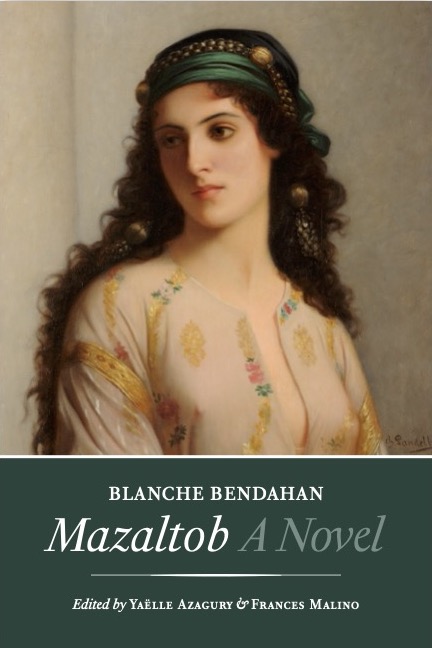Mazaltob: A Novel
Blanche Bendahan, author; Yaëlle Azagury and Frances Malino, editors
A first-ever English translation of a compelling work by a forerunner of modern Sephardi feminist literature. 
Raised in the Judería or Jewish quarter of Tetouan, Morocco at the turn of the 20th century, sixteen-year-old Mazaltob finds herself betrothed to José, an uncouth man from her own community who has returned from Argentina to take a wife. Mazaltob, however, is in love with Jean, who is French, half-Jewish, and a free spirit.
In this classic of North African Jewish fiction, Blanche Bendahan evokes the two compelling forces tearing Mazaltob apart in her body and soul: her loyalty to the Judería and her powerful desire to follow her own voice and find true love. Bendahan’s nuanced and moving novel is a masterly exploration of the language, religion, and quotidian customs constraining North African Jewish women on the cusp of emancipation and decolonization.
Yaëlle Azagury and Frances Malino provide the first English translation of this modern coming-of-age tale, awarded a prize by the Académie Française in 1930, and analyze the ways in which Mazaltob, with its disconcerting blend of ethnographic details and modernist experimentation, is the first of its genre—that of the feminist Sephardi novel.
Purchase from the Brandeis University Press
About the Authors
Blanche Bendahan (née Benoliel) was born in Oran, Algeria on November 26, 1893, to a Jewish family of Moroccan-Spanish origin. Shortly after her birth, her family moved to France, where she was educated in the French system. Bendahan published her first collection of poetry, La voile sur l’eau, in 1926 and then her first novel, Mazaltob, in 1930. Mazaltob, which won an award from the Académie Française, portrays a North African woman in Tetouan, Morocco, and the oppression to which she is subjected by the patriarchal society in which she lives.
Yaëlle Azagury is a writer, literary scholar, and critic. She was Lecturer in French and Francophone Studies at Barnard College, and Lecturer in Discipline in the English and Comparative Literature Department at Columbia University. She has contributed essays and scholarly articles for Women Writing Africa and Rethinking Jewish Culture and Society in North Africa and the Middle East, among other scholarly volumes. She is a native of Tangier, Morocco.
Frances Malino is the Sophia Moses Robison Professor of Jewish Studies and History Emerita at Wellesley College. She is author of The Sephardic Jews of Bordeaux: Assimilation and Emancipation in Revolutionary and Napoleonic France (1978) and A Jew in the French Revolution: The Life of Zalkind Hourwitz (1996) and co-editor of Essays in Modern Jewish History: a Tribute to Ben Halpern (1982), The Jews in Modern France (1985), Profiles in Diversity: Jews in a Changing Europe (1998), and Voices of the Diaspora: Jewish Women Writing in the New Europe (2005). In 2012 she was named Chevalier dans l’Ordre des Palmes académiques by the French Ministry of Education.